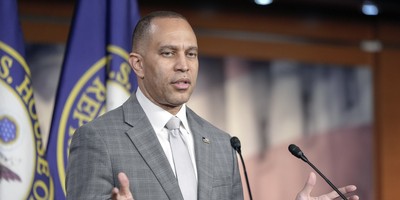For several decades now, it has become cliché for activists to call for a “national discussion” on various issues of the day. Such calls have come for issues including race, the environment and education reform. If these discussions were sincere and willing to confront what can be some unpleasant truths, they would be a benefit to our country. However, what we mostly get are highly politicized talking points and an avoidance of the critical issues.
Our nation can’t afford political posturing any longer. We are in desperate need of a real national discussion, understanding and action on the immigration crisis we currently face. A good place to start is on one of the most abused and misrepresented areas of the immigration issue, asylum reform.
Thanks in large part to media talking heads and politicians with anti-borders agendas, Americans have been given a distorted picture of what asylum to this country actually means.
First, it should be noted that asylees (those seeking asylum) and refugees are not the same. Asylees are those who have found their way to the United States and now seek protection from alleged persecution by their government in their home country. Refugees are outside the U.S. and petition our government for protection. Because of the current crisis at our border, an overwhelming number of people are entering the country and then seeking asylum.
For several decades, many have called attention to the fact that our asylum process is wide open to fraud and abuse. This can be seen in abundant cases where asylum seekers have been coached by immigration lawyers, human trafficking cartels and others to embellish stories to qualify for asylum.
The initial step, the “credible fear” test, asks applicants if they fear for their lives back in their homeland from government persecution. An affirmative response will likely get the applicant through to the next round, with very little to document the claim. With such a low bar to clear, seeking asylum is often considered a back-door through the immigration process.
Recommended
How do we know that many asylum-seekers make less-than-truthful claims? More than 70 percent of asylum seekers ultimately have their claims rejected. Undaunted by this obstacle, the anti-borders movement simply works to change the rules of the game by loosening the criteria for asylum.
The Immigration and Nationality Act, our current immigration law, specifies that asylum can be granted to those fearing a return to their homeland over persecution by their government based on account of “race, religion, nationality, membership in a particular social group or political opinion.” By expanding the definition of “particular social group,” activists have created giant loopholes in asylum procedures.
After the Obama administration expanded grounds for asylum by adding domestic violence and gang crime as forms of persecution, the number of credible fear claims by aliens rose by 2,000 percent. Today immigration courts are drowning in hundreds of thousands of cases waiting to be heard.
Adding domestic violence to the criteria really serves to make a mockery of our national sovereignty. If those claiming to suffer from domestic violence can get asylum, then asylum to the U.S. is cheap and available to virtually everyone on the planet, and on very flimsy premises. What if the alleged domestic violence is just a “he-said, she-said” situation? How are we to prove domestic violence in many cases? Why is moving to the U.S. the only remedy?
The Trump administration introduced policies that sought to fix many of these problems. The Migrant Protection Protocols, which included the “Remain in Mexico” policy, addressed the failure of catch-and-release and greatly reduced the incentive for foreign nationals to make the journey to the southern border. The Trump “safe third county” policy was a common-sense solution to those suffering from persecution. Then-Attorney General William Barr gave clarity to the “social group” section of asylum law. Help had come to the long-neglected problem of asylum reform.
The arrival of the Biden administration has seen an undoing of that help. The most recent reversal of Trump policies has been an expansion of the asylum criteria to include domestic violence and gang activity. In short, a return to the Obama-era permissiveness that saw record spikes in arrivals from all over the world. The difference is that today we have a fragile, COVID-ravaged economy and a nation sitting on a powder keg of social and political upheaval.
Yes, we need a national discussion on asylum reform and the immigration crisis at large. The people must demand it, however, the last thing the current administration wants is to be forced to defend and explain what it is doing about it.
Dale Wilcox is executive director and general counsel at theImmigration Reform Law Institute, a public interest law firm working to defend the rights and interests of the American people from the negative effects of illegal migration.
























Join the conversation as a VIP Member